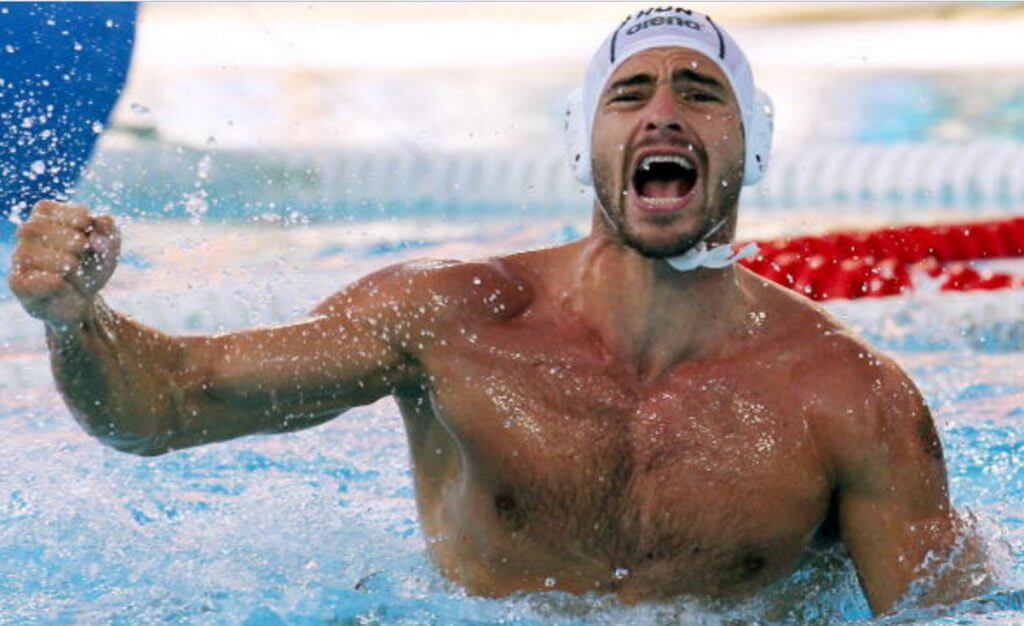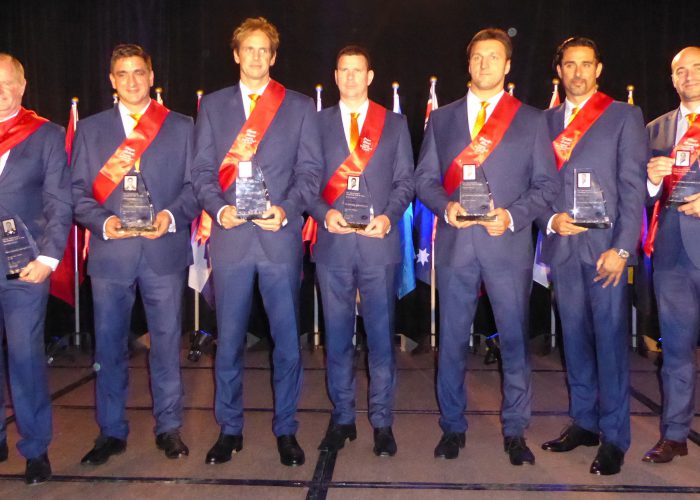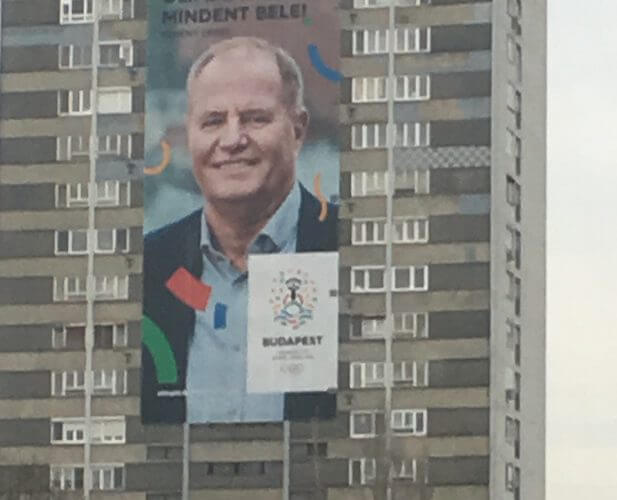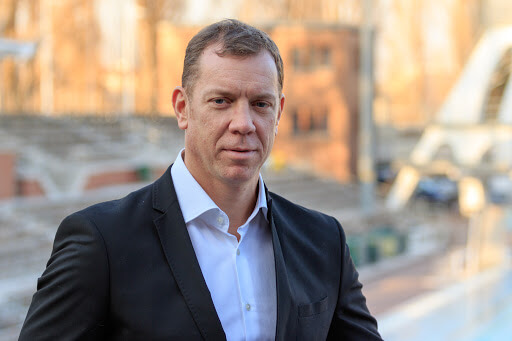Remembrances of Tibor Benedek: Water Polo Great Taken Too Soon

A. E. Housman’s “To an Athlete Dying Young” is an English 101 staple. Employing a simple rhyming scheme, anyone can easily follow Housman’s poetical path, culminating in a four-stanza punch line:
Now you will not swell the rout
Of lads that wore their honors out,
Runners whom renown outran
And the name died before the man.
What brings this verse to mind is the untimely passing, at 47, of Tibor Benedek, perhaps the greatest competitor ever to emerge from Hungary’s exceptional water polo tradition. One of a select few to compete in five Olympics, the supremely talented Benedek was among a handful of men—all Hungarian—to win three gold medals in water polo competition.
[Passages: Tibor Benedek, Three-Time Olympic Water Polo Gold Medalist, 47]
And he so did in three straight Games: 2000, 2004 and 2008. After leading Hungary—and everyone else—in goals scored in his first two Olympic appearances in 1992 and 1996, by 2000 Benedek had elevated his and his countrymen’s game to championship level, resulting in a dominant 13-6 win over Russia and the first in that string of gold.
Fronting a stellar cast that included Peter Biros, Tamas Kasas, Gergely Kiss, Tamas Molnar and Zoltan Szecsi, Hungary and Benedek matched the achievements of Dezso Gyarmati and Gyorgy Karpati in the 1952, 1956 and 1964 Games, where the Hungarians also captured golds, while settling for bronze in 1960.

Three-time Olympic gold medalists at their 2018 International Swimming Hall of Fame (ISHOF) induction ceremony: Denes Kemeny, Tamas Molnar, Tamas Kasas, Peter Biros, Gergely Kiss, Zoltan Szecsi and Benedek. Photo Courtesy: Bruce Wigo
Karpati passed away a few days before Benedek, at the age of 85. His younger polo comrade lived roughly half of Karpati’s span, reminding the polo world that “The flame that burns twice as bright burns half as long.”
[Passages: Gyorgy Karpati, Three-Time Olympic Water Polo Gold Medalist, 84]
Benedek died of pancreatic cancer a few weeks shy of his 48th birthday. As recalled below by those who knew and competed with or against him, there’s no question regarding his powerful impact on polo and his country.
***
Head coach for the U.S. senior men’s water polo team since 2014, Dejan Udovicic was a player and coach for Partizan in Yugoslavia during the ‘90s, then was elevated to head coach of the Serbian national team in 2006. As the American coach, his team was in the draw for the 2016 Rio Games along with a Hungarian squad coached by Benedek
– Tibor Benedek passed away at a young age. You and he are contemporaries; how do you understand his death at the age of 47?
I knew he was really bad, but his wife and everyone was hoping—because he’s a warrior—he would overcome his sickness and continue to live [his] life. But that did not happen. It shocked the world. There’s no doubt about that.
I was really shocked because he’s almost my age. We didn’t play against each other that many times, but I knew him very well. We coached on opposite sides for previous Olympic cycles when he was leading the Hungarian team for Rio. We worked together and had some joint practices.
It’s not easy to talk about [this], but I believe his legacy will continue. There’s no doubt, because he deserves that—as an athlete, as a coach, as a person.
– How does one measure Benedek’s impact on the sport?
Coming from Europe, I know more about him than people here in the States. For me, a funny, good story. After the 2017 World Championships in Budapest was a masters’ tournament. During that competition, the team that won three gold medals back to back played an exhibition game. Everyone was impressed [that] on Margaret Island, there were 10,000 people for an exhibition game. It was more people watching that game than watched the world championships two weeks before.
I told them: That’s normal; they’re icons. The team, and especially Benedek, one of the leaders of that group. On the right side with [Gergely] Kiss and on the left side [Tamas] Kasas. They’re icons and everybody respects them.

Denes Kemeny
He was one of the first to play from the right side as a lefty. Post-up, he could play multiple positions.
What I admired was playing for Pro Recco and for the [Hungarian] national team.
There are very few athletes who are committed to practices and their games on a daily basis [the way Benedek did]. He was doing everything at a high level, and that is to be respected.
– That was your generation as a coach, watching what it took for Benedek and his teammates to win three-straight golds, one of the greatest feats in Olympic history
For me, it’s not easy to talk about because I was the Serbian head coach from 2006 until 2014. Unfortunately, we didn’t [get to] play in the finals in Beijing [in 2008]. That was our main goal from 2006 to 2010, when we lost [to Hungary] in Zagreb for the European Championship for the first time in four years. [Until then] we were unbeaten against the Hungarian national team.
It’s an unbelievable achievement. Adam Krikorian and his team has an opportunity to repeat that. I don’t think in the future that there will be too many teams besides the American women to be in a situation to make a three-peat [in the Olympics].
What they did from 2000‒2008, it doesn’t matter how many stories or which Olympic Games or what happens during [the Tokyo] competition. They won three golds…it’s top of the mountain.
***
Denes Kemeny, Hungarian team coach who won three gold medals in Olympic play with Benedek as his captain—and who turned over the reins of the national team to his star player when he retired.
– When did you first see Tibor Benedek?
He was 16, we had a practice together. I realized his talent and mental power. Later, I saw him playing on the national team. He was a leader.
– What was impact on his teammates as well as Hungarian fans?
He was an emblematic player of [the Hungarian] team, so the fans in Hungary were connecting themselves to [water polo] by him for a long time
– What made him so good?
His diligence, will and power made him an outstanding, world-class player—even with a lot of rivals.
– How did know he was the right person to follow you as national team coach?
Tibor as a player was an excellent team captain. Coaching him, I realized that he had everything to become a good head coach, and [so] he became!
– With the passing of Gyorgy Karpati and Tibor Benedek, it’s a sad moment for Hungarian water polo.
Karpati was 85, that is what you can support emotionally. But Tibor, less then 48, is very difficult to digest.
We hope our best for our future.
***
Tamas Marcz was Benedek’s teammate on the 2000 Hungarian team that won the first of three straight Olympic golds—and Marcz took over the national team when Benedek was forced to step away from the program after leading Hungary to a fifth-place finish in the 2016 Rio Olympics.

Tamas Marcz. Photo Courtesy: Madar David
I trusted until the last moment that Tibor would be able to face the disease with his characteristic will to fight. We lost not only a huge athlete, but an amazingly good professional, a fantastic father and husband.
He was the best on every front.
We were in touch with each other until the last minute. He left a lot of things here for all of us. Not just medals, professional materials, literature related to water polo, but a sense of human mortality, morality and fairness—which characterized him.
Everyone will miss it very much; he is already very much missed. Irreplaceable people have been lost to the water polo society, the Hungarian nation.
***
Bruce Wigo, former director of USA Water Polo, historian, and president of the International Swimming Hall of Fame in 2018 when Benedek and his teammates from the great run of Olympic success, Biros, Kasas, Kiss, Molnar, and Szecsi, as well as Kemeny, were inducted into the ISHOF Hall of Fame.
I remember Benedek from his days on the junior team when he and Tamas Kasas were the future superstars of the sport. In the pool, he was a fierce competitor. Out of the water he was one of the nicest players I ever met. Always kind and accommodating to me and my family.
A tremendous loss to Hungary and the world.
A champion in and out of the water.



